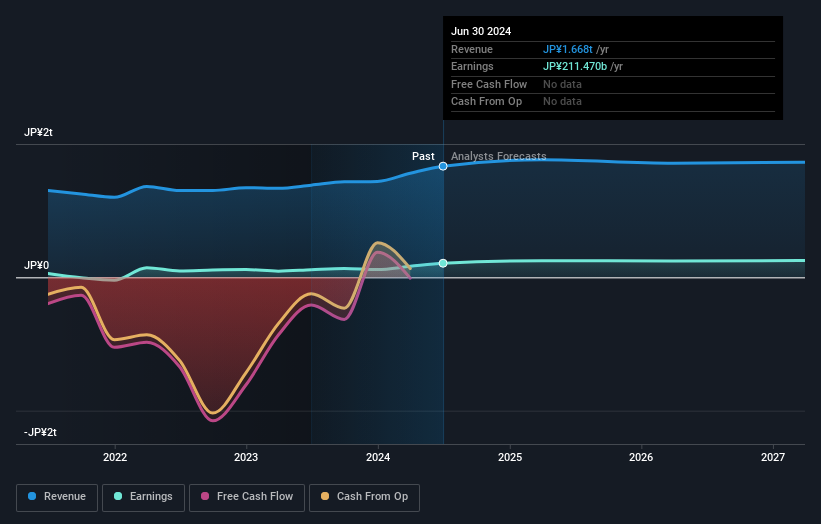- Japan
- /
- Capital Markets
- /
- TSE:8604
Individual investors account for 55% of Nomura Holdings, Inc.'s (TSE:8604) ownership, while institutions account for 44%

Key Insights
- The considerable ownership by individual investors in Nomura Holdings indicates that they collectively have a greater say in management and business strategy
- 39% of the business is held by the top 25 shareholders
- 44% of Nomura Holdings is held by Institutions
A look at the shareholders of Nomura Holdings, Inc. (TSE:8604) can tell us which group is most powerful. We can see that individual investors own the lion's share in the company with 55% ownership. Put another way, the group faces the maximum upside potential (or downside risk).
And institutions on the other hand have a 44% ownership in the company. Institutions will often hold stock in bigger companies, and we expect to see insiders owning a noticeable percentage of the smaller ones.
Let's delve deeper into each type of owner of Nomura Holdings, beginning with the chart below.
Check out our latest analysis for Nomura Holdings

What Does The Institutional Ownership Tell Us About Nomura Holdings?
Institutions typically measure themselves against a benchmark when reporting to their own investors, so they often become more enthusiastic about a stock once it's included in a major index. We would expect most companies to have some institutions on the register, especially if they are growing.
As you can see, institutional investors have a fair amount of stake in Nomura Holdings. This implies the analysts working for those institutions have looked at the stock and they like it. But just like anyone else, they could be wrong. It is not uncommon to see a big share price drop if two large institutional investors try to sell out of a stock at the same time. So it is worth checking the past earnings trajectory of Nomura Holdings, (below). Of course, keep in mind that there are other factors to consider, too.

Hedge funds don't have many shares in Nomura Holdings. BlackRock, Inc. is currently the largest shareholder, with 7.8% of shares outstanding. With 5.8% and 4.1% of the shares outstanding respectively, Sumitomo Mitsui Trust Asset Management Co., Ltd. and Nomura Asset Management Co., Ltd. are the second and third largest shareholders.
A deeper look at our ownership data shows that the top 25 shareholders collectively hold less than half of the register, suggesting a large group of small holders where no single shareholder has a majority.
Researching institutional ownership is a good way to gauge and filter a stock's expected performance. The same can be achieved by studying analyst sentiments. Quite a few analysts cover the stock, so you could look into forecast growth quite easily.
Insider Ownership Of Nomura Holdings
The definition of company insiders can be subjective and does vary between jurisdictions. Our data reflects individual insiders, capturing board members at the very least. Company management run the business, but the CEO will answer to the board, even if he or she is a member of it.
I generally consider insider ownership to be a good thing. However, on some occasions it makes it more difficult for other shareholders to hold the board accountable for decisions.
Our information suggests that Nomura Holdings, Inc. insiders own under 1% of the company. Being so large, we would not expect insiders to own a large proportion of the stock. Collectively, they own JP¥1.8b of stock. It is good to see board members owning shares, but it might be worth checking if those insiders have been buying.
General Public Ownership
The general public -- including retail investors -- own 55% of Nomura Holdings. This size of ownership gives investors from the general public some collective power. They can and probably do influence decisions on executive compensation, dividend policies and proposed business acquisitions.
Next Steps:
I find it very interesting to look at who exactly owns a company. But to truly gain insight, we need to consider other information, too. Consider for instance, the ever-present spectre of investment risk. We've identified 2 warning signs with Nomura Holdings , and understanding them should be part of your investment process.
If you are like me, you may want to think about whether this company will grow or shrink. Luckily, you can check this free report showing analyst forecasts for its future.
NB: Figures in this article are calculated using data from the last twelve months, which refer to the 12-month period ending on the last date of the month the financial statement is dated. This may not be consistent with full year annual report figures.
Valuation is complex, but we're here to simplify it.
Discover if Nomura Holdings might be undervalued or overvalued with our detailed analysis, featuring fair value estimates, potential risks, dividends, insider trades, and its financial condition.
Access Free AnalysisHave feedback on this article? Concerned about the content? Get in touch with us directly. Alternatively, email editorial-team (at) simplywallst.com.
This article by Simply Wall St is general in nature. We provide commentary based on historical data and analyst forecasts only using an unbiased methodology and our articles are not intended to be financial advice. It does not constitute a recommendation to buy or sell any stock, and does not take account of your objectives, or your financial situation. We aim to bring you long-term focused analysis driven by fundamental data. Note that our analysis may not factor in the latest price-sensitive company announcements or qualitative material. Simply Wall St has no position in any stocks mentioned.
About TSE:8604
Nomura Holdings
Provides various financial services to individuals, corporations, financial institutions, governments, and governmental agencies worldwide.
Undervalued with proven track record and pays a dividend.

